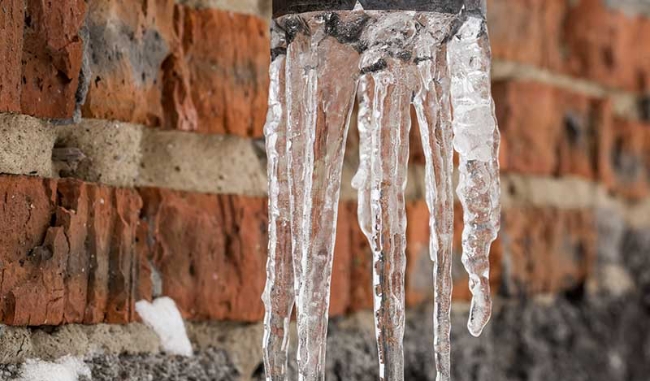Prevent Frozen Pipes in Winter: Professional Advice
Prevent Frozen Pipes in Winter: Professional Advice
Blog Article
We have encountered the article involving Preventing and dealing with frozen pipes below on the net and concluded it made perfect sense to share it with you on my blog.

Cold weather can damage your pipes, particularly by freezing pipes. Right here's exactly how to stop it from happening and what to do if it does.
Introduction
As temperatures decline, the danger of icy pipelines boosts, potentially leading to pricey repair services and water damage. Understanding how to prevent icy pipelines is critical for home owners in cool environments.
Prevention Tips
Protecting susceptible pipelines
Wrap pipes in insulation sleeves or utilize heat tape to protect them from freezing temperature levels. Focus on pipelines in unheated or external areas of the home.
Heating techniques
Keep interior areas properly heated, especially areas with pipes. Open cabinet doors to allow warm air to flow around pipelines under sinks.
Just how to identify frozen pipelines
Try to find decreased water flow from faucets, uncommon smells or noises from pipes, and visible frost on revealed pipelines.
Long-Term Solutions
Structural modifications
Think about rerouting pipes far from exterior walls or unheated locations. Add added insulation to attics, basements, and crawl spaces.
Updating insulation
Buy high-grade insulation for pipes, attic rooms, and walls. Proper insulation aids keep consistent temperatures and reduces the danger of frozen pipes.
Safeguarding Outside Pipes
Garden hoses and outdoor taps
Disconnect and drain pipes garden tubes prior to winter season. Mount frost-proof spigots or cover exterior faucets with protected caps.
Comprehending Frozen Pipes
What causes pipes to ice up?
Pipes freeze when revealed to temperature levels listed below 32 ° F (0 ° C) for expanded durations. As water inside the pipelines freezes, it increases, taxing the pipe wall surfaces and potentially creating them to burst.
Threats and problems
Icy pipelines can cause water supply disturbances, building damage, and pricey fixings. Burst pipelines can flood homes and trigger comprehensive structural damages.
Indicators of Frozen Pipes
Identifying icy pipes early can prevent them from rupturing.
What to Do If Your Pipelines Freeze
Immediate activities to take
If you presume frozen pipelines, maintain taps open to soothe pressure as the ice thaws. Utilize a hairdryer or towels taken in warm water to thaw pipes slowly.
Verdict
Protecting against frozen pipes calls for aggressive steps and quick responses. By understanding the reasons, signs, and preventive measures, homeowners can safeguard their plumbing during cold weather.
6 Proven Ways to Prevent Frozen Pipes and Protect Your Home
Disconnect and Drain Garden Hoses
Before winter arrives, start by disconnecting your garden hoses and draining any remaining water. Close the shut-off valves that supply outdoor hose bibs and leave the outdoor faucet open to allow any residual water to drain. For extra protection, consider using faucet covers throughout the colder months. It’s also important to drain water from any sprinkler supply lines following the manufacturer’s directions.
Insulate Exposed Pipes
Insulating your pipes is an effective way to prevent freezing. Pipe insulation is readily available at home improvement stores and is relatively inexpensive. Pay close attention to pipes in unheated areas such as the attic, basement, crawl spaces, or garage. Apply foam insulation generously to create a buffer against the cold. You can also wrap your pipes in heat tape or thermostat-controlled heat cables for added warmth.
Seal Air Leaks
Inspect your home for any cracks or openings that could let in cold air. Seal any holes around the piping in interior or exterior walls, as well as the sill plates where your home rests on its foundation. Additionally, make sure to keep your garage door closed unless you’re entering or exiting. Leaving it open creates a significant air leak that can lead to frozen pipes.
Allow Warm Air Circulation
During cold snaps, it’s essential to allow warm air to circulate evenly throughout your home. Leave interior doors ajar to promote better airflow. Open kitchen and bathroom cabinets to help distribute heat consistently around the rooms. If you have small children or pets, be sure to remove any household chemicals or potentially harmful cleaners from open cabinets for safety.
Let Faucets Drip
A small trickle of water can make a big difference in preventing ice formation inside your pipes. When temperatures drop significantly, start a drip of water from all faucets served by exposed pipes. This continuous flow helps prevent the water from freezing. Additionally, running a few faucets slightly can relieve pressure inside the pipes, reducing the chances of a rupture if the water inside does freeze.
https://choateshvac.com/6-proven-ways-to-prevent-frozen-pipes-and-protect-your-home/

I am very drawn to How to Prevent Your Pipes From Freezing and I really hope you enjoyed reading our entry. If you liked our post kindly be sure to pass it around. I am grateful for your time. Come back soon.
Services Report this page